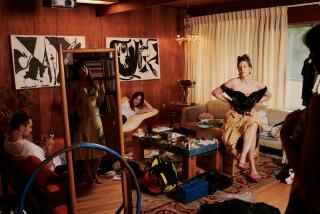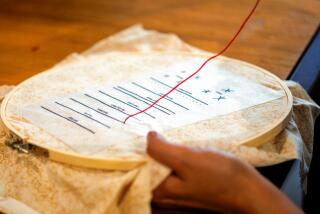Troops’ Safety Is Stitched Into the Very Fabric of This Town
- Share via
ELIZABETH, W.Va. — The big, bare work bay where Kim Thomas sews has its doors and windows flung open to the greening hills. But as she bends over her sewing machine, running an olive vest under the needle with practiced hands, Thomas doesn’t see the Appalachian spring before her.
She is thinking instead of sandstorms and rough seas, of antiaircraft fire -- and of all the young men and women on the front lines in Iraq whose lives might well depend on the garment she’s stitching.
For days, the talk of this small town has been the rescue from an Iraqi hospital of Pfc. Jessica Lynch, who grew up a few miles down the road in the farm community of Palestine. Thomas and her 90 co-workers joined the rejoicing. But they quickly turned their focus back to the risks facing the 290,000 troops still in the Persian Gulf region. They had to.
Mustang Survival Manufacturing Inc. -- the only big private employer in this country town of 900 people -- sews bomber jackets, pilot coveralls, underwater rescue suits, life preservers and cold-water immersion gear for the Army, Air Force, Navy and Coast Guard. In two converted warehouses a block from the village green, workers stitch insulated and inflatable survival gear on rows of sewing machines decorated with American flags.
The company motto is: “We save lives for a living.” And employees are proud of their part in the war.
“It’s in everybody’s mind all the time,” said Thomas, 30, who was working on a crewman survival vest for the Air Force -- designed to hold night-vision goggles, an oxygen canister, a radio, a pistol and other gear needed in case the pilot is forced to eject over hostile territory.
“We think of all the soldiers out there,” she said. “The ones already fallen, the ones still missing. We’re all glad Jessica’s coming home, but we want everyone to keep in mind all the others too.”
Every time they see a photograph or a TV clip from the front, Mustang employees study the clothing the troops are wearing, eager to spot their handiwork in action. For years, their gear was mostly visible in the movies; Tom Cruise wore one of their suits in “Top Gun,” as did the rescuers in “The Perfect Storm.”
Now, though, they’re seeing not the glamour but the grit, their products tested under the strain of combat. They have caught glimpses of their gear on CNN. Last week, they watched as two pilots wearing Mustang survival suits were fished out of the Persian Gulf -- uninjured, but for bruised ankles -- after their plane skidded off an aircraft carrier.
“Did you see that guy sitting in the chopper yesterday? It was in the paper,” Rick Thomas, a material control specialist, asked two co-workers as they took a smoke break on the loading dock. “He had on one of our survival vests. Had the harness on and everything.”
“That was the Mach 5,” Sylvia Steele, an accounting assistant, responded. “We know we made that one.”
Mustang Survival’s corporate offices are in British Columbia, and there’s another manufacturing facility in Canada as well. About four years ago, the company bought the Elizabeth plant -- which had been turning out civilian and military life preservers for two decades, said Kenneth Gulick, vice president for manufacturing.
Workers have been especially busy of late.
The Commerce Department reported last week that even as factory orders for civilian products dropped 1.5%, demand for military goods surged 27.1% in February, the third increase in the last four months. That’s good news not just for defense giants, but also for the many anonymous assembly lines that churn out the little-noticed but much-needed equipment that keeps the U.S. military machine rolling.
Simula Inc. in Tempe, Ariz., makes the 4-pound ceramic plates that slip into soldiers’ flak jackets. Dial Tool Industries in Addison, Ill., turns out the metal brackets that clamp night-vision lights onto helmets. A little shop in Pike Lake, Minn., produces the heavy-duty slings used to hoist Humvees, torpedoes and other military equipment.
Here in Wirt County, where the unemployment rate is 15%, Mustang Survival just had its contract to produce Air Force survival vests extended.
The webbed netting for the vests -- in military-issue olive drab -- is heaped high on tables throughout the warehouse. An inspector picks up every garment as it’s made and holds it to the light, tugging at the seams and snipping off loose threads. There is little chatter, just the click of the sewing machines and the whir of the ceiling fans overhead.
Several of the employees have relatives serving in Iraq. For Kathy Wagoner, 42, who works in harness assembly, it’s her niece’s husband, in the 101st Airborne Division.
“I think of him when I’m making these,” she said. And she picked up another vest to run through her sewing machine.
More to Read
Sign up for Essential California
The most important California stories and recommendations in your inbox every morning.
You may occasionally receive promotional content from the Los Angeles Times.













